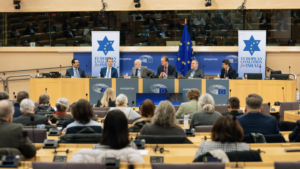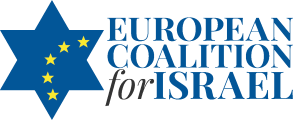 Brussels, March 9th, 2023 – The European Coalition for Israel marked its 20th anniversary on Wednesday, 8th of March by inviting some of the key stakeholders behind the Abraham Accords to a special symposium in the European Parliament in Brussels to discuss how Europe could become more involved in the normalization process in the Middle East. Senior officials from the European External Action Service (EEAS) as well as from European Commission DG Neighbourhood and Enlargement negotiations assured the audience that the diplomatic normalisation process between Israel and a growing number of former enemies in the Sunni Muslim world has the full support of the European Union.
Brussels, March 9th, 2023 – The European Coalition for Israel marked its 20th anniversary on Wednesday, 8th of March by inviting some of the key stakeholders behind the Abraham Accords to a special symposium in the European Parliament in Brussels to discuss how Europe could become more involved in the normalization process in the Middle East. Senior officials from the European External Action Service (EEAS) as well as from European Commission DG Neighbourhood and Enlargement negotiations assured the audience that the diplomatic normalisation process between Israel and a growing number of former enemies in the Sunni Muslim world has the full support of the European Union.
However, senior members of the European Parliament challenged the European Commission to do more. “The European Union could start by becoming an official signatory of the Abraham Accords”, said MEP David Lega from Sweden. “The European Union could align more with the countries who have already signed the Abraham Accords and offer them free trade agreements”, suggested MEP Lukas Mandl from Austria.
Spanish MEP Antonio López-Istúriz White regretted the lack of enthusiasm for the Abraham Accords in Europe over the last three years. “We were not there from the beginning but now we need to step up and get involved”, he said.
“The dynamics behind the Abraham Accords is the same as in the early days of the European integration process”, he explained. “No one could believe that old enemies such as the French and the Germans could one day sit down together at the same table to discuss cooperation but today it is a reality! The same thing is happening in the Middle East and Europe should be the first to actively support this process.”
Both the Kingdom of Bahrain and the United Arab Emirates were represented at the conference. Answering a question on what more the EU could do concretely to support the process of normalisation, Ambassador Abdulla Bin Faisal Al Doseri called upon the European Union to issue an official statement or declaration in support of the Abraham Accords. “This would give the right signal to those nations which are currently considering joining this new circle of peace as they would understand that it has the full support of the European Union”, he explained.
Many of the speakers, including conference co-host, ECI Founding Director Tomas Sandell called for a more active involvement also of the Palestinians in the normalisation process and in the newly established Negev Forum where also the European Union is involved in some of the working groups. He also reminded the EU officials represented at the symposium that in order to include the Palestinians in this peace process the EU needs to immediately apply conditionality on any future funding of Palestinian textbooks to prevent further radicalization. In the panel, the UAE was commended for including Holocaust education in its new curriculum. “If we want future generations to live in peace and co-existence with each other we have to prepare them from the very beginning and not allow for incitement and hatred in school textbooks”, Sandell said and was supported by the Members of the European Parliament who were present.
The symposium was a first of its kind in that it brought together European stakeholders both from the European Commission and the European Parliament with some of the key states behind the Abraham Accords to discuss the next steps of the normalisation process. The symposium was co-hosted by Dutch MEP Bert-Jan Ruissen and featured the following speakers: MEP David Lega, MEP Lukas Mandl, MEP Anna-Michelle Assimakopoulou, MEP Elena Yoncheva, Vice-President Nicola Beer, the Ambassador of Israel to the EU, Haim Regev, the Ambassador of Bahrain to the EU, Abdulla Bin Faisal Al Doseri, Michael Mann from the European External Action Service, Gerhard Krause from DG Neighbourhood and Enlargement Negotiations and Ehab Hino from the Israeli mission to the EU. The Ambassador of UAE, Mohamed Al Sahlawi was prevented from attending the symposium in person but was represented by a senior diplomat.
